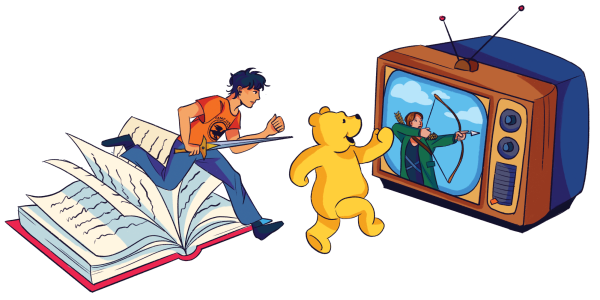
From “Harry Potter” to “Little Women”, book-to-movie adaptations have been a hot topic in both literary and film communities. Some adaptations exceed expectations and expand on the words originally written by the author, while others have left fans disappointed by a movie that feels like an obvious cash grab. After experiencing some abysmal results, it might seem like a hopeless endeavor to adapt a novel to a screenplay. But despite the weight of expectations, many directors still take that leap of faith hoping to satisfy die-hard fans and produce a loved film.
One pro of creating adaptations for books is their tendency to perform well in theaters. Movies adapted from books on average gross 53% more than their normal counterparts according to WordsRated, which is an incentive to adapt a book to film. These films even have an advantage before the release of their first trailer: an abundance of literature super-fans who have been begging to see their favorite book translated into film. More interest in a movie will mean more initial tickets sold and therefore more money made.
Just because a movie might be of more intrigue to fans does not mean that it will automatically be considered high quality. For example, the 2010 movie “Percy Jackson and the Lightning Thief” grossed a decent $226 million worldwide according to BoxOfficeMojo, and then went on to receive a disappointing 5.9/10 IMDb rating. Even the author, Rick Riordan, shamed the movies for straying so far from the book plots, saying in a tweet from 2020, “I judge them from having read the scripts because I care most about the story. I certainly have nothing against the very talented actors. Not their Fault. I’m just sorry they got dragged into that mess.”
A book-to-movie adaptation, when done well, can also expand the world created by the author, helping the story reach people it never would have in written form. The “Harry Potter” movie series, an adaptation generally considered to be well loved and widespread, has not only made around $7.7 billion in theaters worldwide, but has also led to the creation of a Universal Studios park entirely dedicated to the fantasy world described in the book. The “Harry Potter” film series did many things right in the production process, from always staying true to the text to impeccable casting, which helped contribute to the growth of the world of Hogwarts into the worldwide phenomenon that it is known as today.
Currently, films adapted from books make up 28% of all movies produced in the English language according to WordsRated, which raises questions about the economic and creative value of basing a film script on a piece of literature. After examining the successes of different adaptations, it seems that whether the movie is based on a book or is an original script has less impact on the accomplishment of a film than other factors such as the casting or the writers. Although the adaptation route may spark interest early on and more likely than not generate a large profit for the filmmakers, these are not the only things that determine a “good movie” and any story can be good in its own right with good production.
To achieve the task of creating a good adaptation, the developers need to be able to visualize the book in cinematic form. Creating a movie based on a good book should not be a job taken lightly if the filmmakers want to do the original text justice. If the producers want to create a film adaptation that surpasses expectations, then they must stay true to the story and the characters.

